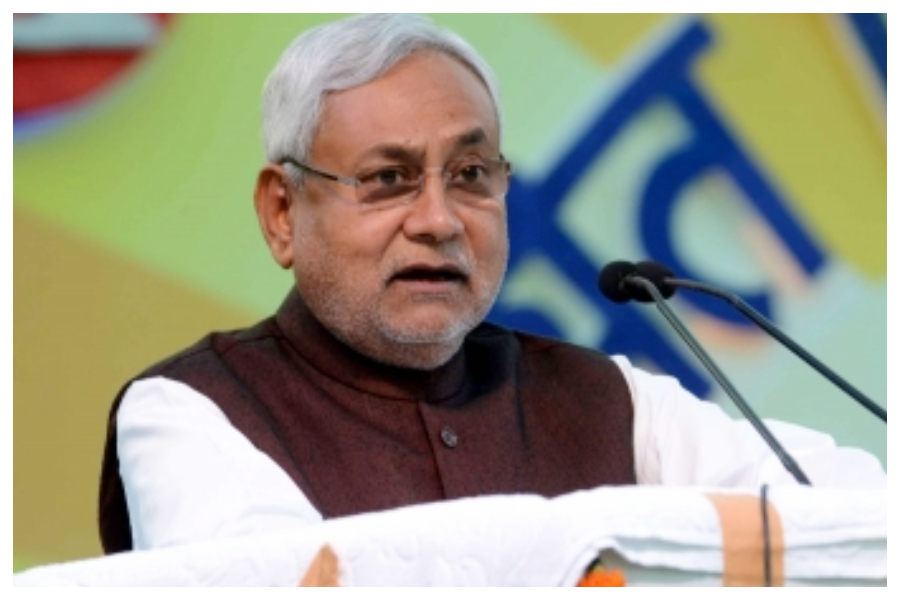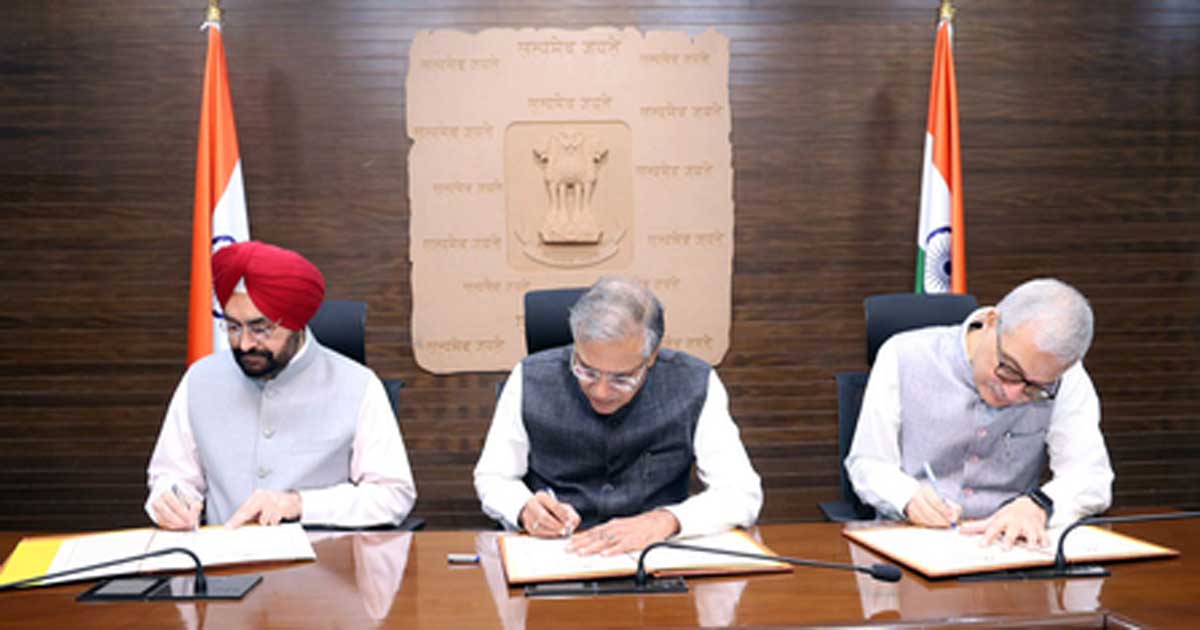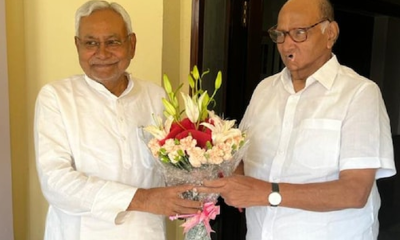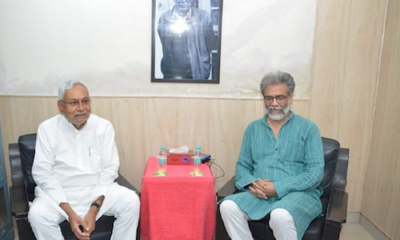National News
Nitish Kumar, socialist leader of Bihar, emerges as challenger to Modi-Shah

At a time when the duo of Narendra Modi and Amit Shah are dictating terms, Bihar Chief Minister Nitish Kumar not only challenged but also sent a message to the BJP and the RSS about his political daring without caring about the CBI, ED and the Income-Tax department.
Nitish Kumar, a socialist leader of Bihar, was elected as the chief minister for the eighth time.
Kumar, a product of the political school of Karpoori Thakur and Jayaprakash Narayan was influenced by the socialist ideology of these two great leaders of Bihar.
He was influenced by the social justice and making of a Samata Mulak Samaj ideology of Karpoori Thakur and also participated in the Sampoorna Kranti movement in 1977 led by Jayaprakash Narayan.
Nitish Kumar was born in a Kurmi family in Bakhtiyarpur town in Patna district on March 1, 1951. His father was an Ayurvedic doctor, Kaviraj Ram Lakhan Singh and his mother was Parmeshwari Devi.
He obtained a degree in mechanical engineering from the Bihar College of Engineering (now the National Institute of Technology NIT) Patna. During this period, he was influenced by the ideology of two-time former chief minister Karpoori Thakur (the first tenure of Karpoori Thakur was from December 22, 1970 to June 2, 1971 and his second tenure was from June 24, 1977 to April 21, 1979).
Karpoori Thakur headed the Janata Party government having amalgamated with the Bhartiya Jan Sangh which later turned into the Bharatiya Janata Party (BJP).
The Janata Party was influenced by the ideology of Jayaprakash Narayan and Ram Manohar Lohia. They broadly believed in the social philosophies of Mahatma Gandhi and BR Ambedkar.
Karpoori Thakur, during his second tenure, had given 33% reservation to the Backwards in Bihar following the recommendation of the Mungeri Lal Commission. The Bhartiya Jan Sangh which was considered the party of the upper caste people, was not pleased with the decision. Leaders like Kailash Pati Mishra, the then finance minister in the Karpoori Thakur government, revolted against him in April 1979 and he lost his majority in the Bihar assembly.
At that time, Indira Gandhi was undoubtedly the strongest leader in the country. However, the Sampoorna Kranti movement of 1974 put the brakes on her political career.
The Allahabad High Court found Indira Gandhi guilty of rigging the election and imposed a ban for six years on her from contesting elections on June 12, 1975. Indira Gandhi, then imposed an Emergency on the country on June 25, 1975. During the Emergency, leaders like Jayaprakash Narayan, Karpoori Thakur, Ram Manohar Lohia and others were sent to jail. At that time, Lalu Prasad Yadav, Nitish Kumar, Ram Vilas Paswan and others joined the Janata Party and were also jailed.
Nitish Kumar was elected an MLA from Harnaut assembly constituency in Nalanda district in 1985.
In 1989, he contested the Lok Sabha election from Barh constituency in Patna district and won the seat. He was in the VP Singh government and served as union minister of state for agriculture and cooperatives.
VP Singh had implemented the Mandal commission report in the country and the BJP which had 88 MPs had withdrawn its support to Singh. At that time, the Mandal Vs Kamandal politics was going on and BJP leader LK Advani started his Rath Yatra for the demolition of the Babri Masjid.
When the 10th Lok Sabha election was held in 1991, Nitish Kumar was elected again on the ticket of Janata Dal from Barh constituency.
Lalu Prasad Yadav had emerged as the social justice leader of Bihar with his strong vote bank of the Yadav and Muslim communities. He gave strength to the backward, extremely backward, marginalised communities of Bihar and became the strongest leader in Bihar. He became chief minister in 1990 for the first time with the Janata Dal.
Socialist leaders George Fernandes and Nitish Kumar then left the Janata Dal and led the foundation of the Samata Party whose ideology was secularism.
Nitish Kumar was again elected to the Lok Sabha in 1996 with the Samata Party from Barh and George Fernandes won the seat from Nalanda.
He then went with the BJP in the 13-day government of Atal Bihari Vajpayee. When asked why he went with a party whose ideology was just the opposite to his socialist ideology, he told mediapersons that political survival against Lalu Prasad was more important then socialist ideology. This is the survival strength of Nitish Kumar and this is the reason why he became the chief minister of Bihar for the eighth time.
He was again elected in 1998 to the 12th Lok Sabha and served as union minister for railways with the additional charge of the surface transport ministry.
In 1999, he was elected again to the Lok Sabha and became the union minister of railways, surface transport and agriculture in the Atal Bihari Vajpayee government.
He first became the chief minister of Bihar from March 3, 2000 to March 10, 2000.
He contested the Lok Sabha election in 2000 and again served as the union minister of railways and agriculture in the Vajpayee government.
By then, Nitish Kumar had become the tallest leader of the Kurmi-Koiri and other backward class communities. That was the phase when Lalu Prasad was facing charges of fodder scam, and a number of massacres during the first tenure of his wife Rabri Devi’s government from 1996 to 2000.
Nitish Kumar got good support from the backward class apart from his traditional Kurmi-Koiri vote bank. He merged his Samata Party into the Janata Dal-United (JD-U) in 2003. During the 2005 assembly elections, the JD-U managed to win 88 seats and became the single largest party in Bihar. He formed the government in Bihar with the help of the BJP.
Nitish Kumar got the tag of Sushasan Babu of Bihar with a number of welfare schemes like giving reservations to backward classes in government jobs. He gave 50% reservation to women in the electoral process of Panchayati Raj. He worked for social justice in his first term and managed to uproot organised crime like kidnapping for ransom in the state.
He gained the support of the people of Bihar and the JD-U managed to win 118 seats in 2010 assembly election.
As per the statement of senior leader Lalan Singh on Wednesday, Nitish Kumar could have easily formed the government in Bihar but he took the BJP in the government and respected the alliance partner.
In 2013, when the BJP nominated Narendra Modi as the prime ministerial candidate of the NDA, Nitish Kumar objected to it and came out of the NDA.
During the Modi wave in 2014, the JD-U fared badly in the Lok Sabha elections. Nitish Kumar took the responsibility for it and resigned as chief minister. Jitan Ram Manjhi became the CM.
Nitish Kumar took over as chief minister again from Jitan Ram Manjhi in November 2014 and formed an alliance with Lalu Prasad Yadav’s RJD. They made the Mahagathbandhan and also included the Congress party. They won the 2015 assembly election on the formula of 100: 100 seats to the RJD and the JD-U and 43 seats to the Congress.
Lalu Prasad, in 2015 announced that Nitish Kumar will be the chief minister’s face of the Mahagathbandhan. When the election results came in, the RJD won 80 seats, the JD-U 73 and the Congress 29. They managed to stop the BJP at 53 seats in Bihar despite a strong Modi wave.
The RJD, despite having more seats than the JD-U, made Nitish Kumar the chief minister of Bihar.
Apart from Lalu Prasad, the other RJD leaders thought that the chief minister’s post should come to the RJD, and they started targeting Nitish Kumar. A war of words started between the RJD and the JD-U. Nitish Kumar, who has one of the sharpest political brains, started looking for an opportunity and he picked on the corruption charges against Tejashwi Yadav in the IRCTC scam as an ideal excuse for him to come out from the Mahagathbandhan.
Though Lalan Singh, the national president of the JD-U, clarified during a press meet on August 10, 2022 that there were four leaders including Sanjay Jha, Harivansh, RCP Singh and another leader who gave him wrong advice to break the alliance with the RJD and the Congress and join the NDA.
Nitish Kumar joined the NDA in 2017 and formed the government with the help of 53 MLAs of the BJP in Bihar.
In the 2020 assembly election, Nitish Kumar contested under the umbrella of the NDA and became the chief minister of Bihar for the 7th time. After the result of the election, JD-U leaders accused the BJP of back-stabbing their party.
When Nitish Kumar resigned from the post of Chief minister on August 9, he said: “I was not interested in holding the post of chief minister after the 2020 assembly election. They insisted on me. Today’s BJP has a different ideology then the BJP of Atal Ji and Advani Ji.”
“The way BJP was trying to sabotage our party, we have discussed aspects with our MPs, MLAs and MLCs and every one suggested that I come out from the NDA. We have listened to their voices and resigned from the post of chief minister,” Kumar said.
“The National Democratic Alliance (NDA) was formed in 1996 and at that time respected Atal Bihari Vajpayee, LK Advani, Murli Manohar Joshi and George Fernandes were the leaders. The JD-U was associated with the NDA for the next 17 years. The reason was Atal Ji, Advani Ji, MM Joshi Ji, and George Saheb were respecting the coalition partners. Those leaders had principles to respect the coalition partners. And what happened now, BJP is back-stabbing its coalition partners,” Lalan Singh said.
“During the 2019 Lok Sabha election, the BJP wanted to win the polls. Hence, its leaders did not do any mischief. When it came to the 2020 assembly election of Bihar, what they did, BJP leaders back-stabbed us and weakened us,” Lalan Singh said.
National News
JD(U) demands one-phase polling in ECI meeting with 12 political parties in Patna

Patna, Oct 4: The Election Commission of India (ECI) on Saturday held a crucial meeting with 12 recognised political parties in Patna ahead of the Bihar Assembly elections. Chief Election Commissioner Gyanesh Kumar chaired the meeting and assured that all suggestions put forward by the parties would be considered before finalising the poll schedule. The ruling JD(U) sought Assembly polls to be held in a single phase.
Speaking to reporters after the meeting, JD(U) working president Sanjay Jha, who represented the party, demanded that the Assembly polls be conducted in a single phase.
“We have thanked the Commission for successfully conducting the Special Intensive Revision (SIR) of the voter list. We have requested that the Bihar elections be held in one phase. Law and order and Naxalism are no longer issues in Bihar. If elections can be held in one phase in Maharashtra, why not here? Paramilitary forces should be deployed at all polling stations so that the poor face no difficulties in voting,” Jha said.
Jha also suggested that election dates should be fixed, keeping in mind the Chhath festival, so that people returning home for the festival can also cast their votes.
On the other hand, the RJD’s Aurangabad MP Abhay Kushwaha and the party’s election convener Chitranjan Gagan, who represented the party at the meeting, demanded that polling be conducted in two phases.
“We have asked the CEC to release the data of the 3.64 lakh voters deleted during the SIR process. We have also sought complete security arrangements in Dalit, Mahadalit, extremely backward and backward caste villages, so that these communities can vote freely. In the past, they were often prevented from voting,” Kushwaha said.
Responding to the BJP’s demand that women in burqas be verified by female officers, Kushwaha said: “A new voter list with photographs has already been published after the SIR. Despite this, if the BJP is making such demands, it is nothing but politics.”
The ECI’s consultations mark a significant step in finalising preparations for the high-stakes Bihar polls.
Political observers believe the Commission may announce election dates shortly, with voting likely to take place in multiple phases across the state.
National News
Mumbai: MSF Jawan Killed After Falling From Crowded Local Train Between Malad & Goregaon

Mumbai: A Maharashtra Security Force (MSF) jawan lost his life after falling from a crowded local train on Friday. The incident, which took place between Malad and Goregaon, has once again raised serious concerns over commuter safety during peak hours.
The deceased has been identified as 31-year-old Ganesh Jagdale, who was attached to the Dahisar police station. According to reports, Jagdale had finished his night duty and boarded a Churchgate-bound local from Dahisar around 8:30 am. The train, packed with commuters during the morning rush hour, left him standing precariously close to the door.
Between Malad and Goregaon stations, Jagdale was reportedly caught in a wave of pushing and jostling inside the compartment. Unable to maintain his balance, he fell off the moving train and landed on the tracks. Gravely injured, he was rushed to Shatabdi Hospital in Kandivali, where doctors declared him dead on arrival.
The Borivali Government Railway Police (GRP) registered a case of accidental death. Jagdale had only recently been transferred from Vanrai police station in Goregaon East to Dahisar police station, where he had joined duty just a day earlier.
This accident adds to a growing list of fatalities caused by overcrowding in Mumbai’s suburban trains. Despite repeated incidents, safety measures remain a major concern, with thousands of daily commuters continuing to risk their lives by travelling on open footboards.
Amid rising criticism, the Indian Railways on Friday announced that a prototype of a closed-door local train has been developed and will soon undergo pilot trials. Union Railway Minister Ashwini Vaishnaw had earlier assured that all newly manufactured trains would be equipped with automatic door-closing systems. Efforts are also being made to retrofit the existing fleet to curb accidents caused by passengers falling from open doors.
The move follows the June 9 Mumbra tragedy, where eight commuters died after falling from a crowded train. Officials stress that automatic door closures will majorly enhance passenger safety and reduce such fatal mishaps.
Crime
‘I Love Muhammad’ row: Tension continues in Karnataka’s Belagavi, 11 detained

Belagavi, Oct 4: Tension continued to simmer in Karnataka’s Belagavi city on Saturday following a stone-pelting incident linked to the raising of ‘I Love Muhammad’ slogans.
Police have detained 11 persons and made tight security arrangements across Belagavi city.
The Police Department is on high alert as Chief Minister Siddaramaiah is scheduled to visit the city on Saturday.
According to police, the stone-pelting incident occurred on Friday evening during the ‘Urs’ procession. While the procession was underway, “I Love Muhammad” slogans were raised. When objections were raised, the mob resorted to stone pelting near the Khadak Galli area.
The police also stated that they have obtained video evidence showing youths chanting ‘I Love Muhammad’ slogans and engaging in violence.
The Police further said that the group changed the procession route without permission.
Khade Bazar Police have detained 11 people in connection with the incident and are questioning them. A case has been registered, and further investigation is underway.
Security has been tightened since Friday night, with police patrolling throughout the night, the police said.
A platoon of the Karnataka State Reserve Police (KSRP) has been deployed in the Khade Bazar area. Police have indicated that more persons will be taken into custody in connection with the incident.
Meanwhile, Hindutva activists have put up ‘Har Har Mahadev’ banners in Belagavi city. Taking the situation seriously, police are maintaining a strict vigil.
In another development, an ‘I Love Muhammad’ banner installed at Aland in Kalaburagi district was removed by jurisdictional police on Saturday.
The banner had been put up as part of the Laadle Mashak Dargah urs programme. After receiving information, police rushed to the spot and cleared the banner.
An investigation is ongoing.
Earlier, two groups clashed over an ‘I Love Muhammad’ poster in Davanagere city, further fueling tensions.
-

 Crime3 years ago
Crime3 years agoClass 10 student jumps to death in Jaipur
-

 Maharashtra12 months ago
Maharashtra12 months agoMumbai Local Train Update: Central Railway’s New Timetable Comes Into Effect; Check Full List Of Revised Timings & Stations
-

 Maharashtra12 months ago
Maharashtra12 months agoMumbai To Go Toll-Free Tonight! Maharashtra Govt Announces Complete Toll Waiver For Light Motor Vehicles At All 5 Entry Points Of City
-

 Maharashtra1 year ago
Maharashtra1 year agoFalse photo of Imtiaz Jaleel’s rally, exposing the fooling conspiracy
-

 National News12 months ago
National News12 months agoMinistry of Railways rolls out Special Drive 4.0 with focus on digitisation, cleanliness, inclusiveness and grievance redressal
-

 Maharashtra11 months ago
Maharashtra11 months agoMaharashtra Elections 2024: Mumbai Metro & BEST Services Extended Till Midnight On Voting Day
-

 National News1 year ago
National News1 year agoJ&K: 4 Jawans Killed, 28 Injured After Bus Carrying BSF Personnel For Poll Duty Falls Into Gorge In Budgam; Terrifying Visuals Surface
-

 Crime12 months ago
Crime12 months agoBaba Siddique Murder: Mumbai Police Unable To Get Lawrence Bishnoi Custody Due To Home Ministry Order, Says Report


















